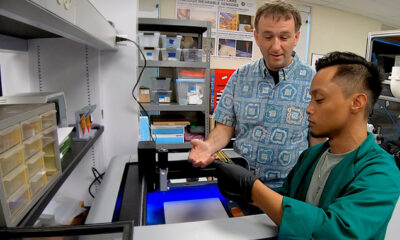Science
Gene Therapy Reduces Cholesterol Levels Significantly in Trial

A recent Phase 1 clinical trial has revealed that a single dose of an experimental gene-editing therapy can lead to significant reductions in cholesterol and triglyceride levels, marking a potential breakthrough in the treatment of high cholesterol. Conducted by CRISPR Therapeutics, this innovative therapy aims to provide a long-term solution for individuals struggling with elevated cholesterol levels.
Presented at the American Heart Association annual meeting in New Orleans, the trial involved 15 participants, primarily men in their 50s and 60s from Australia, New Zealand, and the UK. These individuals had a history of uncontrolled high cholesterol and triglycerides despite previous treatment attempts. The therapy, known as CTX310, utilizes CRISPR technology to target the ANGPTL3 gene, which is crucial in cholesterol metabolism. By modifying this gene, the therapy aims to mimic the effects seen in individuals with naturally low-functioning versions of ANGPTL3, leading to lower cholesterol and triglyceride levels.
The results of the trial were promising. Participants in the highest dosage group experienced a remarkable reduction in LDL cholesterol by 48.9% and a drop in triglycerides by 55.2% within just two months of treatment. This could potentially significantly reduce their risk of heart disease for the rest of their lives.
Despite these encouraging findings, researchers stress the necessity for further studies to evaluate the long-term safety of this approach. The long-term implications of altering a person’s genetic code are a primary concern for the medical community. While the initial data suggest a beneficial impact on harmful fats in the blood, ongoing research will focus on monitoring the liver for any adverse effects. Some participants reported mild side effects, including nausea and back pain, during the infusion, while one experienced a temporary spike in liver enzymes. It is worth noting that one participant passed away months later due to an unrelated cause.
This gene-editing therapy offers a potential alternative to daily medications currently used to manage high cholesterol, such as statins. Many patients cannot tolerate these medications due to side effects, making a single-dose option particularly appealing. Researchers hope that if proven safe, CTX310 could revolutionize the management of cholesterol levels and cardiovascular disease, which remains the leading cause of death in many countries.
As the medical community awaits more comprehensive data, the promise of gene-editing therapies like CTX310 could transform treatment protocols for high cholesterol, offering patients a long-lasting solution. The developers remain committed to ensuring that their therapy is both safe and effective. While the current findings are promising, extensive safety trials must be conducted before the therapy can be widely recommended.
The journey toward integrating gene-editing therapies into standard medical practice is still in its infancy. However, the results from this trial indicate a significant advancement in the fight against heart disease, signaling hope for those at high risk due to elevated cholesterol levels.
-

 Science3 months ago
Science3 months agoUniversity of Hawaiʻi Joins $25.6M AI Project to Monitor Disasters
-

 Business3 months ago
Business3 months agoForeign Inflows into Japan Stocks Surge to ¥1.34 Trillion
-

 Entertainment2 months ago
Entertainment2 months agoHudson Williams Gains Popularity as Breakout Star on Heated Rivalry
-

 World3 months ago
World3 months agoBoeing’s Merger with McDonnell Douglas: A Strategic Move Explained
-

 Science2 months ago
Science2 months ago$1.25M Grant Advances Hawaiʻi’s Real-Time Hazard Monitoring
-

 Entertainment3 months ago
Entertainment3 months agoSydney Sweeney Embraces Body Positivity Amid Hollywood Challenges
-

 Top Stories3 months ago
Top Stories3 months agoBOYNEXTDOOR’s Jaehyun Faces Backlash Amid BTS-TWICE Controversy
-

 Top Stories3 months ago
Top Stories3 months agoUrgent Farewell: Joleen Chaney Leaves Legacy at KFOR
-

 World3 months ago
World3 months agoFrench Film Explores Group Therapy in ‘Group – The Schopenhauer Project’
-

 Top Stories3 months ago
Top Stories3 months agoMarc Buoniconti’s Legacy: 40 Years Later, Lives Transformed
-

 Lifestyle4 months ago
Lifestyle4 months agoKelsea Ballerini Launches ‘Burn the Baggage’ Candle with Ranger Station
-

 Top Stories3 months ago
Top Stories3 months agoCarson Wentz Out for Season After Shoulder Surgery: Urgent Update









